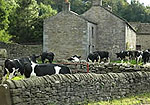Shadow foreign secretary voices support for local food producers

Former Conservative leader and shadow foreign secretary William Hague has voiced his support for regionally-branded food as a way of ensuring the future sustainability of rural economies.
Speaking at an event today (23 March) organised by the Wensleydale Creamery – which is based in his constituency in the Yorkshire Dales – Mr Hague said it was important to protect iconic British brands, particularly in more remote areas.
“The Wensleydale Creamery is a splendid example of a local company with growing international recognition. Forty upland farms within a 15-mile radius supply it and the close ties it has with local farms is reassuring to see. The careful cultivation of relationships between suppliers and consumers is vital to sustaining the survival of agricultural communities.”
Mr Hague was optimistic that an application for Protected Designation of Origin status for Real Yorkshire Wensleydale cheese would be accepted by Europe later this year. If so, it would provide legal brand protection to cheese produced from the Wensleydale region and would join a list of just 16 products in the UK with similar PDO status – such as Cornish clotted cream and Swaledale cheese.
“It’s a lengthy and complicated process that began over two years ago, but we hope to have some good news soon,” he said.
But, perhaps one of the biggest threats to the Wensleydale brand could come from lack of confidence among farmer suppliers, said William Lambert, who represents farmers supplying the creamery. “I am very concerned about the future of milk supply in Wensleydale,” he told Farmers Weekly. “There is a lot of worry about long-term succession plans and lack of confidence among current and future generations is a major factor.”
Many of the farms contracted to supply the Hawes creamery were small family units, with herd sizes of around 50 cows. “We have always received a premium price [currently around 26p/litre], but a lot of that is swallowed up by the higher cost of production in this area. For example, cows are often inside for a good eight months and the narrow roads mean that only smaller wagons can get up to the farms.”
